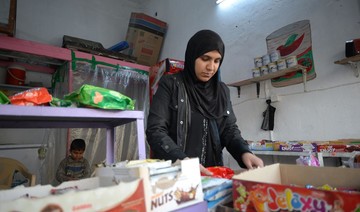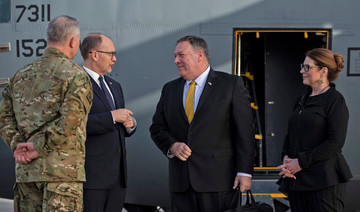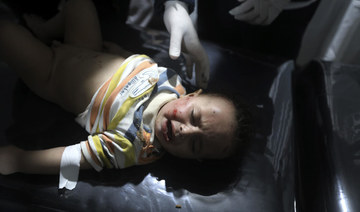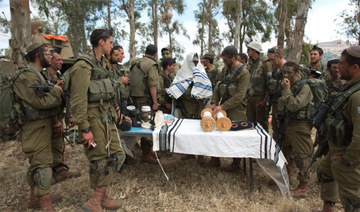BZEIBIZ, Iraq: It was a cold and gusty day in December when the army came to the Bzeibiz camp and told families displaced by the war against the Daesh group that it was time to go home.
The fighting was over, they said, and the camp west of Baghdad was going to be closed.
Some of the families protested that they had no homes to return to. The army said they would be sent to Amariyat Al-Fallujah, a remote camp ringed by chain-link fences and barbed wire.
“They threatened us,” said Khalwa Hamid, 27. “They said, whoever doesn’t leave, we’ll haul them out in our Humvees.”
In the next few days, close to 800 families filed out, according to family interviews and UN data.
A little over a year since the country fought its last battle against the Daesh group, but well before it has gotten a handle on reconstruction, Iraq is closing its camps for the displaced in western Anbar province and casting vulnerable families into a maelstrom of peril.
Many families cannot return home, accused by their tribes of collaborating with Daesh. Others worry there is no work, schooling, or housing to return to. Stragglers are being sent to two tightly-controlled camps deep in the plains of Anbar, where military authorization is required to leave.
“We were displaced once because of IS. Do we have to go through this again because of the government?” said Hamid.
When Daesh militants swept through north Iraq in 2014, they triggered a migration and displacement crisis unprecedented in Iraq’s history. Millions fled their homes in the face of the militants’ rapid advance; others fled as Iraqi forces, backed by the US and Iran, battled back, ultimately reclaiming the last town in late 2017.
Some 1.8 million people out of Iraq’s population of 38 million are still waiting to return to their communities.
Destitute, homeless, and unprotected by the courts, displaced families have borne the brunt of the political and personal score-settling underway in post-war Iraq.
Since liberation, thousands of men have been swept up in arrests for alleged affiliation with Daesh — more than 19,000 in prison as of March 2018 . Many of them have been pushed through cursory trials lasting only a few minutes that often end in convictions and death sentences.
Between June and December 2018, Iraqi security forces closed three of the Anbar’s five displaced persons camps — Bzeibiz, Kilo 18, and Khalidya — which together sheltered more than 12,000 people, according to UN figures. At least 3,000 of them were pushed into the Amariyat Al-Fallujah and Habbaniyah Tourist City camps, already the largest in the province.
Maj. Gen. Mahmoud Khalaf Al-Falahi, commander of the armed forces in Anbar, said the army was doing its utmost to return families to their communities of origin, while consolidating the remaining camps to provide better security and services.
“If these camps stay, then we are going to raise another generation of Daesh,” he said.
At Bzeibiz, families had just days to pack their belongings. Several families said officers collected personal information and fingerprints that, they were told, were for IDs.
“But three or four days later, an officer came and said, everyone get out, because you all gave your fingerprints. We didn’t know about this provision. We signed for badges,” said Naima Abd, 37.
The camp had housed 4,896 people, or 831 families, according to a Dec. 15 UN census. When The Associated Press visited four days later, it was nearly deserted. Empty tents sagged under the winds, and discarded furnishings littered the dirt lanes. Hamid, who worked at a medical charity in Bzeibiz, said only 47 families had remained.
Hundreds were moved to much harsher circumstances in Amariyat Al-Fallujah, fifteen kilometers (9 miles) to the west and host to more than 21,000 people.
Schools are understaffed, and clinics are not equipped to provide the specialized care that many war victims require, such as treatment for chronic pain, nerve damage or blindness.
Guards make sure no one leaves the camp without army permission.
“Some of the people being held in Amariyat Al-Fallujah are, de facto, in detention,” said Belkis Wille, senior Iraq researcher at Human Rights Watch.
Qusay Jasser, 54, said he was selling his food rations to pay for regular appointments to treat his daughter’s eyes at a hospital in Baghdad. But some weeks, the guards do not let them through. They demand a fresh letter from the hospital confirming each appointment.
“There are 100,000 hurdles to leaving,” said Sabah Ahmed, a Bzeibiz resident who wound up in Amariyat Al-Fallujah.
Al-Falahi, the Anbar commander, said all humanitarian cases were allowed through checkpoint at the camp entrance. But he said the Army has an obligation to secure the camps against militants circulating among displaced families, an assertion that could not be verified because of restrictions placed on the media.
“Those who want to work should go back to their areas,” he said. “Those who want their freedom of movement should go back to their areas.”
Conditions were similarly severe at the Habbaniyah Tourist City camp, with a population of 11,706. A military detail followed the AP around the camp and photographed reporters interviewing residents.
Residents said food rations were inadequate and families were huddling together in unheated tents to stay warm in near freezing temperatures.
Camp residents may leave to work, but there are no settlements for miles around, except for the nearby resort which lends the camp its name. It’s only open in the summer.
On Dec. 5, the army moved 190 families to Habbaniyah after closing Kilo 18 in much the same way it closed Bzeibiz approximately two weeks later.
Kilo 18 suffered from winter floods, but it had a free clinic, a delivery room, a psych center, and a center for victims of gender-based violence — facilities not available at Habbaniyah.
Hassan Jalal, 80, from Kilo 18, said he did not choose to move to Habbaniyah; he wanted to return home. He produced military documents showing that he had been checked by six security agencies and against 10 witnesses to confirm he had no links to Daesh. But two of his sons, now deceased, had been members of the jihadi group, and his village’s mayor barred him from returning with his family.
“I hope day after day to return home. Even if I have to eat dirt, it’s better than living in this humiliation,” said Jalal.
Even families that make it home are finding conditions trying beyond their imagination.
Hadi, a father of five who asked for his details to be withheld to avoid friction with the authorities, removed his children from school in Bzeibiz to return to his village near Al-Qaim, one of the last cities liberated from Daesh in 2017.
But when they arrived they found that their home was damaged and the local school was shuttered. The children are now sitting at home with their parents. The nearest school is miles away.
“We don’t have a car, and I can’t find any work,” said Hadi.
Iraq closes camps for displaced, pushes families into peril
Iraq closes camps for displaced, pushes families into peril
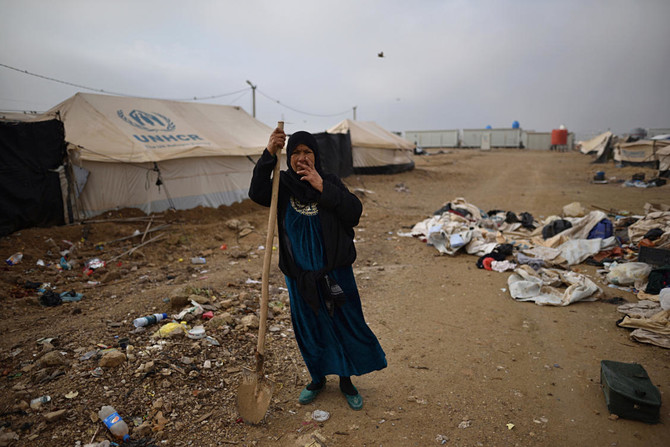
- When Daesh militants swept through north Iraq in 2014, they triggered a migration and displacement crisis
- Some 1.8 million people out of Iraq’s population of 38 million are still waiting to return to their communities
Lebanon postpones local elections again as violence rocks south
Parliament approved “extending the existing municipal and elective councils’ mandate until a date no later than May 31, 2025,” despite objections from lawmakers opposed to Hezbollah
BEIRUT: Lebanon’s parliament on Thursday delayed municipal elections for a third time in two years, state media reported, as militants in the country’s south exchanged near-daily fire with Israel for over six months.
The powerful Iran-backed Hezbollah group has been trading fire with Israeli forces across the border since the day after its Palestinian ally Hamas carried out a deadly attack on Israel on October 7, triggering the ongoing war in the Gaza Strip.
Lebanon is supposed to hold municipal elections every six years, but cash-strapped authorities last held a local ballot in 2016.
Parliament approved “extending the existing municipal and elective councils’ mandate until a date no later than May 31, 2025,” despite objections from lawmakers opposed to Hezbollah, said the official National News Agency.
The bill cited “complex security, military and political circumstances following the Israeli aggression on Lebanon” and especially its south, near the border, as reasons for the delay.
Lawmakers did not set a new date for the elections, initially scheduled for 2022.
Local councils help provide basic services to residents, but their role has declined as state coffers ran dry after Lebanon’s economy collapsed in late 2019.
Parliament Speaker Nabih Berri had previously said southern Lebanon could not be excluded from any upcoming ballot, after the Christian Lebanese Forces, the main party opposing Hezbollah, insisted on holding the polls on time.
More than 92,000 people have been displaced from their homes in Lebanon due to the violence, as have tens of thousands of residents of Israeli communities across the border.
Since violence began along the Israeli border on October 8, at least 380 people have been killed in Lebanon, including 72 civilians, according to an AFP tally.
Israel says 11 soldiers and eight civilians have been killed on its side of the border.
In April 2023, the Lebanese parliament had already postponed municipal elections as the deputy speaker warned holding them was “almost impossible” for the cash-strapped country after years of economic meltdown.
Lebanon has faced the prolonged financial crisis and months of border clashes essentially leaderless, without a president and headed by a caretaker government with limited powers amid deadlock between entrenched political barons.
Palestinian officials say Israeli forces kill teen in West Bank
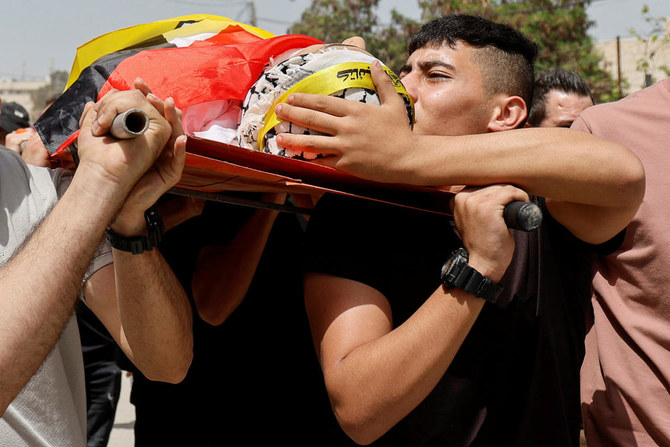
- Israeli police said “hits were identified” when forces responded to stone-throwing with gunfire
- The Palestinian health ministry said Khaled Raed Arouq was shot in the chest and “martyred by the occupation’s live bullets“
RAMALLAH, Palestinian Territories: Palestinian officials said Israeli forces killed a 16-year-old boy during a raid in the West Bank city of Ramallah early on Thursday.
Israeli police said “hits were identified” when forces responded to stone-throwing with gunfire but did not directly address the allegation.
The Palestinian health ministry said Khaled Raed Arouq was shot in the chest and “martyred by the occupation’s live bullets.”
Palestinian official news agency Wafa said Arouq died after being “shot by Israeli gunfire” early on Thursday morning.
Israeli forces carry out regular raids on towns and cities in the occupied West Bank and violence has soared in the Palestinian territory since the war in Gaza broke out on October 7.
Wafa said Israeli military vehicles stormed the city and “confrontations broke out between citizens and the occupation forces, who fired live bullets and stun grenades.”
It said Israeli forces were stationed in several neighborhoods and raided a house in Al-Bireh to the northeast.
Israeli police said: “Terrorists threw stones at the forces operating in the area, the forces responded with gunfire, and hits were identified.”
The police said they made several arrests and that Israeli forces did not suffer any casualties.
The army did not immediately respond to AFP’s request for comment.
Later on, Thursday, mourners carried Arouq’s body wrapped in the flag of Fatah, the political party of Palestinian president Mahmud Abbas, in his hometown of Jenin where he was buried.
“He was hit by a bullet in his back, which exited through his chest...They assassinated him in cold blood,” Majed Arqawi, cousin of Arouq, told AFP.
Wafa said Arouq’s father was an officer in the Palestinian military intelligence service.
Israel has occupied the West Bank since 1967 and at least 488 Palestinians have been killed by Israeli troops or settlers there since October 7, according to Palestinian officials.
At least 19 Israelis have been killed in attacks by Palestinians in the same period, according to official Israeli figures.
Hezbollah denies Israel claim it killed half of commanders in south
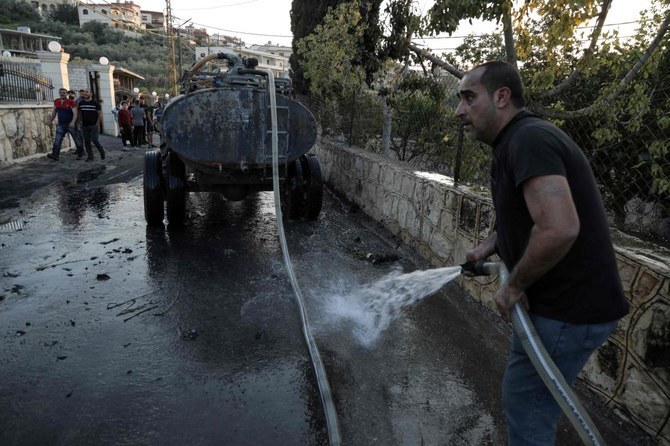
- The number of slain Hezbollah members who “hold a certain level of responsibility does not exceed the number of fingers on one hand“
- Gallant’s claim was “untrue and baseless”
BEIRUT: Hezbollah denied on Thursday an Israeli claim that it had killed half of the Iran-backed Lebanese group’s commanders in the south of the country, saying only a handful were slain.
The Lebanese group has been exchanging near-daily fire with the Israeli army since the day after its Palestinian ally Hamas carried out an unprecedented attack on Israel on October 7.
Israel’s Defense Minister Yoav Gallant said on Wednesday that “half of Hezbollah’s commanders in southern Lebanon have been eliminated” in the months of cross-border violence sparked by the Israel-Hamas war in Gaza.
“The other half are in hiding and abandoning the field to IDF (Israeli army) operations,” he added, without specifying how many.
A Hezbollah source who spoke on condition of anonymity rejected the claim.
The source told AFP that the number of slain Hezbollah members who “hold a certain level of responsibility does not exceed the number of fingers on one hand.”
The source said Gallant’s claim was “untrue and baseless” and designed to “raise the morale of the collapsed (Israeli) army.”
Israel has frequently claimed to have killed local Hezbollah commanders in targeted strikes, but the group has only confirmed a few were high-level members, referring to the rest as fighters in their statements.
Since October 8, the day after the Hamas attack on southern Israel, at least 380 people have been killed in Lebanon, including 252 Hezbollah fighters and dozens of civilians, according to an AFP tally.
Israel says 11 soldiers and eight civilians have been killed on its side of the border.
Tens of thousands of people have been displaced on both sides.
Both sides have stepped up attacks this week, with Hezbollah increasing rocket fire on military bases, while Gallant said in his latest remarks the army had carried out “offensive action” across southern Lebanon.
The Israeli military also said on Wednesday that it had struck 40 Hezbollah targets in Lebanon’s south.
Hezbollah leader Hassan Nasrallah has said his group had some 100,000 “trained” and “armed” fighters, but analysts say this number is likely inflated.
Ahead of feared Rafah invasion, Palestinians mourn dead from Israeli bombardment
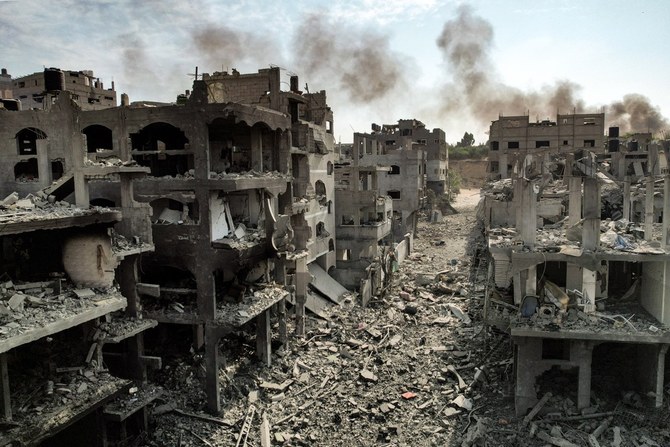
- Aid groups warn any invasion would add to already-catastrophic conditions for civilians
- Government spokesman says Israel ‘moving ahead’ with its operation to go after Hamas in Rafah
GAZA STRIP, Palestinian Territories: Palestinians on Thursday mourned over people killed in Israeli bombardment of Rafah, the southern Gaza city where Israel says it is advancing plans for a ground invasion.
Global concern has mounted over the looming operation against Hamas militants in Rafah, where much of Gaza’s population has sought refuge from more than six months of war in the narrow coastal strip.
Aid groups warn any invasion would add to already-catastrophic conditions for civilians.
Israeli officials have for more than two months vowed to enter Rafah, near the Egyptian border, but even before any ground operation the area has been regularly bombed, including overnight Wednesday-Thursday.
At the city’s Al-Najjar Hospital on Thursday, two men knelt in front of a white body bag in grief, among other mourners gathered at the site.
Elsewhere in the city, Palestinians tried to salvage belongings from the rubble of bombarded buildings.
Israeli government spokesman David Mencer said Israel was “moving ahead” with its operation to go after four Hamas battalions in Rafah.
“They will be attacked,” he said.
The war began with an unprecedented Hamas attack on October 7 that resulted in the deaths of about 1,170 people in Israel, according to an AFP tally of Israeli official figures.
Israel vowed to destroy Hamas, with a retaliatory offensive that has killed at least 34,305 people in Gaza, mostly women and children, according to the Hamas-run territory’s health ministry.
Thursday’s toll included at least 43 more deaths over the previous day.
During their attack militants seized hostages, 129 of whom Israel estimates remain in Gaza, a figure that includes 34 presumed dead.
Hamas on Wednesday released a video of an Israeli-American man who was one of those captured.
Also on Wednesday, US President Joe Biden signed a law authorizing $13 billion in additional military aid to close ally Israel.
Much of that funding is to support the country’s air defenses, which received an unprecedented test this month with Iran’s first-ever direct strike against its foe.
Iran fired more than 300 drones and missiles toward Israel, the Israeli military said, but most were shot down by that country and its allies.
The Iranian barrage followed what it said was a deadly Israeli strike against Tehran’s embassy consular annex in Syria.
The US legislation also included $1 billion in humanitarian aid for Gaza, with Biden demanding it reaches reach Palestinians “without delay.”
The United Nations has warned of imminent famine and “access constraints” on the delivery of humanitarian assistance.
Germany said it would resume cooperation with the main aid agency in Gaza, the UN’s agency for Palestine refugees, or UNRWA, after an independent review found Israel had not yet provided evidence for its allegations that its staff belonged to “terrorist” groups.
Regional tensions remain high as the Gaza war has led to violence between Israel and Iran’s proxies and allies.
Israel has struck increasingly deeper into Lebanon, while the Iran-backed Hezbollah movement has stepped up rocket fire and drone attacks on Israeli military bases across the border.
The violence has fueled fears of all-out conflict between Hezbollah and Israel, which last went to war in 2006.
On Thursday Lebanese state media and a Hezbollah source said one person was wounded in an Israeli drone attack on a fuel truck near Baalbek, the latest such incident away from the southern border.
In other regional fallout, US-led coalition forces shot down an anti-ship missile launched by Yemen’s Iran-backed Houthi rebels, American authorities said on Thursday.
The Israeli military on Thursday said its aircraft had struck more than 30 Hamas targets across Gaza over the previous day.
Witnesses reported clashes between militants and Israeli troops near the Nuseirat refugee camp in central Gaza, as the world’s attention is increasingly focused further south, on Rafah.
Netanyahu in early April gave no details but said “there is a date” for the Rafah operation, over which the United States and others have expressed grave concern because of the concentration of civilians there.
Citing Egyptian officials briefed on Israeli plans, The Wall Street Journal has said Israel was planning to move civilians to nearby Khan Yunis over a period of two to three weeks, before gradually sending in troops.
The hostage in the video released on Hamas’s official Telegram account identified himself as Hersh Goldberg-Polin, 23.
In the video, the authenticity of which AFP has not been able to independently verify, Goldberg-Polin was missing a hand, a wound he suffered during his capture.
In an apparent reference to Jewish Passover which began this week, Goldberg-Polin, likely speaking under duress, told Israeli government members that “while you sit and have holiday meals with your families, think of us, the hostages, who are still here in hell.”
Hostage supporters and anti-government demonstrators have intensified protests — including again on Wednesday night in Jerusalem — for the government to reach a deal that would free the captives, accusing Netanyahu of prolonging the war.
The European Union, the UN rights office and the White House have called for a probe into mass graves found at Gaza’s two biggest hospitals after Israeli raids.
“We want answers,” US National Security Adviser Jake Sullivan said on Wednesday. “We want to see this thoroughly and transparently investigated.”
Israel has repeatedly targeted hospitals during the war, accusing Hamas of using them as command centers and to hold hostages. Hamas denies the accusations.
Gaza’s Civil Defense agency said nearly 340 bodies were uncovered at Nasser Hospital in Khan Yunis city.
Israeli army spokesman Major Nadav Shoshani said on X that “the grave in question was dug — by Gazans — a few months ago.”
The Israeli army acknowledged that “corpses buried by Palestinians” had been examined by soldiers searching for hostages, but did not directly address allegations that Israeli troops were behind the killings.
Israel says it is poised to move on Rafah

- Israel has killed at least 34,183 people in Gaza, mostly women and children, according to Gaza health ministry
- Defense official said Israel had bought 40,000 tents to house Palestinians relocated from Rafah in advance of assault
JERUSALEM: Israel’s military is poised to evacuate Palestinian civilians from Rafah and assault Hamas hold-outs in the southern Gaza Strip city, a senior Israeli defense official said on Wednesday, despite international warnings of humanitarian catastrophe.
A spokesperson for Prime Minister Benjamin Netanyahu’s government said Israel was “moving ahead” with a ground operation, but gave no timeline.
The defense official said Israel’s Defense Ministry had bought 40,000 tents, each with the capacity for 10 to 12 people, to house Palestinians relocated from Rafah in advance of an assault.
Video circulating online appeared to show rows of square white tents going up in Khan Younis, a city some 5 km (3 miles) from Rafah. Reuters could not verify the video but reviewed images from satellite company Maxar Technologies which showed tent camps on Khan Younis land that had been vacant weeks ago.
An Israeli government source said Netanyahu’s war cabinet planned to meet in the coming two weeks to authorize civilian evacuations, expected to take around a month.
The defense official, who requested anonymity, told Reuters that the military could go into action immediately but was awaiting a green light from Netanyahu.
Rafah, which abuts the Egyptian border, is sheltering more than a million Palestinians who fled the half-year-old Israeli offensive through the rest of Gaza, and say the prospect of fleeing yet again is terrifying.
“I have to make a decision whether to leave Rafah because my mother and I are afraid an invasion could happen suddenly and we won’t get time to escape,” said Aya, 30, who has been living temporarily in the city with her family in a school.
She said that some families recently moved to a refugee camp in coastal Al-Mawasi, but their tents caught fire when tank shells landed nearby. “Where do we go?“
Hitting hard
Israel, which launched its war to annihilate Hamas after the Islamist group’s Oct. 7 attacks on Israeli towns, says Rafah is home to four Hamas combat battalions reinforced by thousands of retreating fighters, and it must defeat them to achieve victory.
“Hamas was hit hard in the northern sector. It was also hit hard in the center of the Strip. And soon it will be hit hard in Rafah, too,” Brig.-General Itzik Cohen, commander of Israel’s 162nd Division operating in Gaza, told Kan public TV.
But Israel’s closest ally Washington has called on it to set aside plans for an assault, and says Israel can combat Hamas fighters there by other means.
“We could not support a Rafah ground operation without an appropriate, credible, executable humanitarian plan precisely because of the complications for delivery of assistance,” David Satterfield, US special envoy for Middle East humanitarian issued, told reporters on Tuesday.
“We continue discussions with Israel on what we believe are alternate ways of addressing a challenge which we recognize, which is Hamas military present in Rafah.”
Egypt says it will not allow Gazans to be pushed across the border onto its territory. Cairo had warned Israel against moving on Rafah, which “would lead to massive human massacres, losses (and) widespread destruction,” its State Information Service said.
Israel has withdrawn most of its ground troops from southern Gaza this month but kept up air strikes and conducted raids into areas its troops abandoned. Efforts by the United States, Egypt and Qatar to broker an extended ceasefire in time to head off an assault on Rafah have so far failed.
Gaza medical officials say than 34,000 people have been killed in Israel’s military campaign, with thousands more bodies feared buried under rubble.
Hamas killed 1,200 people and abducted 253 on Oct 7, according to Israeli tallies. Of those hostages, 129 remain in Gaza, Israeli officials say. More than 260 Israeli troops have been killed in ground fighting since Oct 20, the military says.
H. A. Hellyer, a senior associate fellow in international security studies at the Royal United Services Institute, said he expected the assault on Rafah “sooner rather than later” because Netanyahu is under pressure to meet his stated objectives of rescuing hostages and killing all the Hamas leaders.
“The invasion of Rafah is unavoidable because of the way he has framed all of this,” he said. But it will not be possible for everyone to leave the city, so “if he sends the military into Rafah, there are going to be a lot of casualties.”





